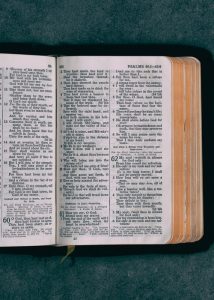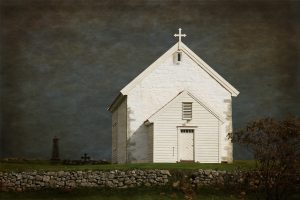The Need for Discernment
With the rise in the number of various social media accounts has also risen the number of people who think they have the gift of discernment and believe it is their duty to lash out harshly at everyone who holds a different opinion. How can we be sure that this is indeed the gift of discernment and not just someone with a critical spirit?
On the other end of the spectrum, we can see many professing believers who appear to have no discernment whatsoever and live in such a way that there is no discernable difference between them and those who do not profess Christ. Discernment is mentioned several times. It is important that we have a proper understanding of what discernment is, and how to do it rightly.
In the Reformed Circles of Facebook and Twitter, there was a great amount stir in late 2018 right up until January 2019’s G3 Convention. Many professing Christians lashed out angrily at Bro. Josh Buice, calling him a “heretic” for allowing certain individuals to speak at the convention who did not sign the Dallas Statement. A much louder commotion amongst evangelicals occurred just a few weeks later at the 2019 Shepherds Conference. Not only did people cry out that Bro. John Macarthur was a “heretic” for the very same reason. Furthermore, the great Shep-Con Debacle occurred at one of the sessions where the panel of individuals were asked specific questions, for which they had not had any time to prepare a concise answer. Why are these two, devout men of God called “heretics” for this? Is there biblical justification for this type of so-called discernment?
Discernment in Scripture
Let’s take a look at scripture where discernment is discussed:
“But examine everything carefully; hold fast to that which is good; abstain from every form of evil.” 1 Thessalonians 5:21-22 NASB
“And in the morning, ‘There will be a storm today, for the sky is red and threatening.’ Do you know how to discern the appearance of the sky, but cannot discern the signs of the times?” Matthew 6:3 NASB
“But solid food is for the mature, who because of practice have their senses trained to discern good and evil.” Hebrews 5:14 NASB
“Moreover, they shall teach My people the difference between the holy and the profane and cause them to discern between the unclean and the clean.” Ezekiel 44:23 NASB
Discernment involves making judgment claims to determine whether something is right, wrong, or whether it is a tertiary issue that can be left to the discretion of the individual. Charles Spurgeon said it best, “Discernment is not knowing the difference between right and wrong. It is knowing the difference between right and almost right.” Discernment not only clarifies right from wrong – and the right from the almost right – but it also reveals and proclaims the truth. Discernment is not just about exposing error.
To do discernment correctly, we must be immersed in scripture. We have to study God’s Word to know what truth actually is, per the above verse in Hebrews. We must be totally devoted to Christ – loving what He loves, hating what He hates – if we are going to be able to recognize what He deems as error. Discernment is not a “feeling” or a “hunch.” It is a vital part of every believer’s life; it is a mark of spiritual maturity. Discernment is a two-sided coin. Not only do we have a requirement to progress in sanctification in order to properly discern, but we also are to trust the Holy Spirit as this is an aspect of His ministry as He indwells believers.
“That is why we should also pray:
“I am your servant; give me discernment.” Psalm 119:125 NIV
Seeking Wisdom
“To know wisdom and instruction, to discern the sayings of understanding, to receive instruction in wise behavior, righteousness, justice, and equity; to give prudence to the naive, to the youth knowledge and discretion, a wise man will hear and increase in learning, and a man of understanding will acquire wise counsel, to understand a proverb and a figure, the words of the wise and their riddles. The fear of the Lord is the beginning of knowledge; fools despise wisdom and instruction.” Proverbs 1:1-7 NASB
Scripture is abundantly clear that we are responsible for what we choose to believe. Discernment is required to be used by all believers. While some may be especially gifted at this – such people make excellent Biblical Counselors! – every believer must learn how to discern rightly. In order to have discernment, we must fear the Lord. The Geneva Study Bible says that this fear is “reverent awe and worshipful response of faith to the God who reveals Himself as Creator, Savior, and Judge.”
There are several other words that correlate with Discernment. Words such as Discretion, Understanding/Wisdom (depending upon the translation), or Instruction. Tim Challies breaks these definitions down beautifully at his article titled “Gain Discernment in 5 Easy Steps” where he elaborates that in order to have discernment, you also need wisdom and intimate knowledge of God.
- Wisdom – Wisdom relates to the mind, the intellect and the control of behavior. Wisdom is a way of thinking about life and reality that enables someone to appreciate and pursue what is good in life while avoiding what is evil. God reveals life’s values and how humans can achieve those.
- Instruction – Instruction is the learning of wisdom through moral and intellectual discipline.
- Discernment – Insight is insight and understanding; the ability to make distinctions between good and bad, better and best. In the book of Proverbs, this is synonymous with the word “insight.”
- Discretion – Discretion is the application of insight in making good decisions.”
Discernment is ultimately learning to view everything through the lens of scripture; learning to think according to God’s Word.
Applying Discernment to Individuals
When we apply the biblical principals of discernment to individuals, we are rightly identifying individuals who cause division in the church. Paul did this, he had no qualms with calling out names, he did so in Acts 19 when he called out Demetrius the silversmith, and in 1 and 2 Timothy. However, this does not mean that it is our duty to label each and every person with a different opinion a heretic, because we are commanded to judge with righteous judgment. What issues require us to mark certain individuals as people whom we need to separate from?
“Remind them of these things, and solemnly charge them in the presence of God not to wrangle about words, which is useless and leads to the ruin of the hearers. Be diligent to present yourself approved to God as a workman who does not need to be ashamed, accurately handling the word of truth. But avoid worldly and empty chatter, for it will lead to further ungodliness, and their talk will spread like gangrene. Among them are Hymenaeus and Philetus, men who have gone astray from the truth saying that the resurrection has already taken place, and they upset the faith of some.” 2 Timothy 2:14-18
When certain theological issues are brought forward, there needs to be a clear cut from these individuals. Anytime that the Doctrinal Truths about Theology proper – the Doctrine of God, Christology (Doctrine of Christ), Pneumatology (Doctrine of the Holy Spirit), Bibliology, Soteriology (Doctrine of Salvation – that salvation is by Grace alone, through Faith alone, in Christ alone) are violated this is a matter of heresy.
Also, when someone is in direct violation of a clear command of scripture – for example, a pastor who is in unrepentant sin (spouse abuse, adultery, etc) and does not meet all of the qualifications found in Scripture we do not associate with them (for example, women who claim to be pastors, it is a direct violation of the qualifications of eldership.)
5 Steps to Discern Rightly
- When a situation is brought before us, and we find ourselves needing to apply discernment we first and foremost need to check out heart. Are we yearning after God? Are we seeking His glory in all of our thoughts, words, and actions? Are we wanting to draw closer to Him more than we want to be right? Do we fear the Lord? Or are we wanting to get more Twitter followers and Facebook likes? Do we just want to appear wise to the masses who read our blog? What is our motive? Are we just annoyed at the situation or mad at whomever it is concerning? Are we hopeful that it will turn out well? Are we truly hopeful that the situation was just a misunderstanding? This is not our natural bent. We are creatures subject to the fall – our hearts are idol factories and utterly depraved. Discernment requires maturity.
“Why do you look at the speck that is in your brother’s eye, but do not notice the log that is in your own eye? Or how can you say to your brother, ‘Let me take the speck out of your eye,’ and behold, the log is in your own eye? You hypocrite, first take the log out of your own eye, and then you will see clearly to take the speck out of your brother’s eye.” Matthew 7:3-5 NASB
- Secondly, we need to consider the subject. Who is being brought forward? There is a vast difference between someone, like Bro. John Macarthur, who has 50 years of pastoring faithfully and someone who has publicly lived a life contrary to scripture. In 1 Timothy 5, Paul wrote to Timothy and urged him to bring concerns about the elders as if he was your own father. If there is any concern about someone in a pastor position, it should be brought to them privately, graciously, respectfully. Paul does elaborate too about what to do if that first private visit does not correct the issue.
- Next, we need to look at the issue at hand. Is the issue that of Heresy? Is the doctrine of the Godhead, the Bible or Salvation being compromised? There can be absolutely no wiggle room on the essentials. Or, is it Heterodoxy, a tertiary issue? Is this an area that believers can disagree on and still hold ecumenism? We don’t go to war over secondary issues. Or is this an issue of Adiaphora, where scripture isn’t exactly clear, and believers are left to decide based on their conscious?
- We also need to take a look at our own knowledge of the situation. Do we have first-hand knowledge? Or are we hearing what someone’s third cousin’s friend’s brother told said to your friend? How much do I know about this subject? How certain are you of your information sources? How much time has passed? Is it wiser for me to wait before making a declaration, since my knowledge isn’t what it should be, but time will allow my knowledge to increase as the situation unfolds? History always happens in time. Some things just need to play out. Almost always, if we jump the gun on discernment issues – we will miss something important and make a wrong judgment call. That is how gossip starts. We must be above reproach. Is the situation private or public? If the situation has not been made public, it is not the duty of believers to do so. That is degrading to the dignity the Bride of Christ should have. We do not need to be the start of gossip.
- Next, we need to ask Why? Why do you feel you should make a judgment call on this? Are you publicly posting your rant on Facebook just to vent some frustration? Do you have anything helpful to add? Or are you just an echo of what everyone else is saying?
In light of Shep Con and G3
Some people were a bit impatient and seemed eager to sever the tie between them and Bro. John Macarthur and Bro. Josh Buice. While we may agree with the Dallas Statement there is not a clear line between good and evil here. There are many devout Christians – whom I know and love – who chose to not sign the statement for very valid reasons. It isn’t a black and white issue – there are varying shades of grey. On one end of the spectrum, the far left, is the Marxist Social Justice Gospel and on the far right of the spectrum are people who 100% adhere with everything on the statement. But some people agreed with part of it and wished for clarification on other areas. They are still my brothers and sisters. Many people would fall at different places on the scale – and we would agree with them on MANY areas.
So how do we view those men in ministry who were invited to these conferences? We show them grace and respect due to their ministry. For any concerns: we pray, hope for the best, and wait. I heard recently on Wretched Radio that the invites for both conferences were sent out well before the Dallas Statement and MLK50. We should not be eager to cut ties, especially about situations that are not perfectly clear. Remember, we do not war over secondary issues. Do these secondary issues need to be discussed? Absolutely, this movement has a lot of damaging potentials, discussing it and clarifying stances is important. Just not with pitchforks and torches in hand.
I had the privilege of sitting down with my friend, Bro. David Miller just a few days after Shep Con to discuss what happened. Bro David is very wise and discerning. I was eager to hear his perspective on the Question and Answer segment with Dr. Mohler. Bro. David spoke graciously and respectfully of the individuals on the platform. These men are followers of Christ who have long-standing ministries. While Bro. David is highly opposed to the Social Justice movement, he acknowledged that it is indeed predominantly, a tertiary issue. But what he focused on, was the need for the Gospel being preached much more so than a public question and answer session. While the topic is fine to address in a different venue, the time could have been spent proclaiming the Gospel of our Lord.
What a reminder that the Gospel should be our primary focus – even in areas of discernment.
To read more about Discernment check out our podcast episode featuring Todd Friel
Discernment and Judge Not with Todd Friel of Wretch TV/Radio
To hear Andrew discussing the Shepcon Conference check out this link:
Discernment and Disqualification with Phil Johnson from Shepherds Conference










0 Comments